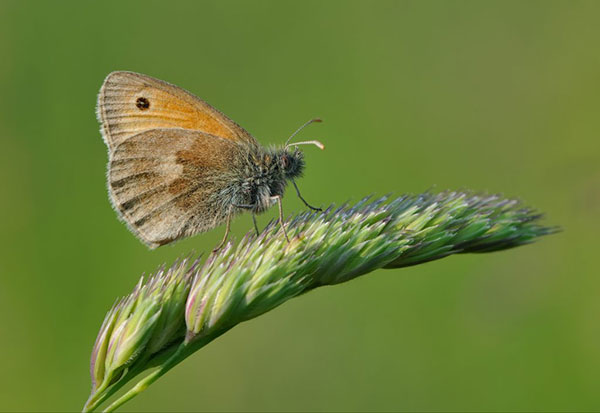The number of flying insects in the UK has fallen by almost 60 per cent in the last 17 years, according to new data gathered by citizens across the country.
The Bugs Matter survey, which is led by the Kent Wildlife Trust and charity Buglife, and supported by a number of other wildlife organisations, uses data collected by people at home who monitor the number of insects ‘splatted’ on their vehicle registration plates.
To collect data, participants clean their number plate before setting off, and then count the insects squashed on the number plate on arrival using a ‘splatometer’ grid that is posted to them.
The survey is inspired by the ‘windscreen phenomenon’, a term given to the general observation that people are seeing fewer insects squashed on the windscreens of their cars today compared to several decades ago.
Numbers fell by 59 per cent between 2004 and 2021, with the greatest declines in England (65 per cent), followed by Wales (55 per cent) and Scotland (28 per cent). There was insufficient data collected for Northern Ireland.
The observed declines are “statistically significant” and are indicative of a worrying pattern, according to the report.
“This vital study suggests that the number of flying insects is declining by an average of 34 per cent per decade, this is terrifying,” said Buglife chief executive, Matt Shardlow.
“We cannot put off action any longer, for the health and wellbeing of future generations this demands a political and a societal response, it is essential that we halt biodiversity decline.”

Director of conservation at Kent Wildlife Trust, Paul Hadaway, said: “The results from the Bugs Matter study should shock and concern us all. We are seeing declines in insects which reflect the enormous threats and loss of wildlife more broadly across the country. These declines are happening at an alarming rate and without concerted action to address them we face a stark future.
“Insects and pollinators are fundamental to the health of our environment and rural economies. We need action for all our wildlife now by creating more and bigger areas of habitats, providing corridors through the landscape for wildlife and allowing nature space to recover.”
Counting insects gives an estimate of the abundance of insect life in towns and countryside, and is also a measure of the health of the environment. Insects are essential to a healthy environment, so when numbers fall it is an indication of wider issues in the landscape.
The UK-focused survey, one of the few citizen-led surveys of its kind, comes as a new study published in science journal Nature found a similar pattern at a global level.
Climate change and intensive farming have combined to halve the number of insects across the planet, said the study, which said it is the first to find that an interaction between rising temperatures and land use changes are driving widespread losses in numerous insect groups across the globe.
Researchers at UCL university in London analysed a large dataset of insect abundance and species richness from areas across the globe, including three-quarters of a million records for nearly 20,000 insect species.
They found that in areas with high-intensity agriculture and substantial climate warming, the number of insects was 49 per cent lower than in the most natural habitats with no recorded climate warming.
Tropical areas saw the biggest declines linked to land use and climate change, while in areas of low-intensity agriculture and substantial climate warming, having nearby natural habitat buffered the losses.
Many insects rely on plants for shade on hot days, so a loss of natural habitats could leave them more vulnerable to a warming climate.
Lead author Dr Charlie Outhwaite, from UCL’s Centre for Biodiversity and Environment Research, said: “Our findings highlight the urgency of actions to preserve natural habitats, slow the expansion of high-intensity agriculture, and cut emissions to mitigate climate change.
“Losing insect populations could be harmful not only to the natural environment, where insects often play key roles in local ecosystems, but it could also harm human health and food security, particularly with losses of pollinators.”












What can we do to help out!?
Have you got a garden? If so, there are some pretty easy wins that make a difference:
1. Grow organically and try not to use any sprays. 2. Things like not mowing your lawn and sowing plenty of pollinators & wild flowers are big wins for insect life. 3. Basically the untidier the better, the patchwork of scruffy allotments is actually some of the most biodiverse areas around.
If you don’t have a garden, buying organic food is one of most direct ways of tackling this issue as they don’t use any chemical sprays on their crops and because of this they have to grow a more diverse array of crops (good for biodiversity). Also bug life starts in the soil and because pesticides can damage soil life and the microorganisms, this has a big rippling effect.
Otherwise: eating a large variety of plants/reducing meat can help biodiversity as vast swathes of heavily sprayed monocultures (dead space for biod) are needed to feed animals.
Would be interested to hear other people’s tips?
Stop building on green land, cut immigration (one million this year alone – more people, more development, less green land), stop using chemicals and plant as many insect friendly plants as possible. This is a BIG issues as things stand right now we only have enough undevelopments useable farmland to feed 40 to 50% of the population, if we lose our pollinators, we lose that too.
Where did you get this stat from? Seems net migration (people immigrating minus those emigrating) is around 239,000 people. I think we’ve seen enough of people using immigrants as scapegoats for issues throughout history, and if the environmental movement is going to succeed in mass structural and cultural change, social justice and all people need to be at the centre of it.
https://commonslibrary.parliament.uk/research-briefings/sn06077/
I have been ‘engaged’ with climate chang and biodiversity issues for many years, (at least 30). My initial actions were focussed on tree planting, returning areas of meadow and peat to their natural state, and promoting building development on brownfield sites.
Sadly, as we all now realise, this is not working. Development of greenbelt sites is increasing daily. Woodlands are being planted on fertile pasture and areas where many and varied crops can be grown.
Considering we now know so much about the challenges facing the planet, and us as the human race, isn’t it time for a global initiative to stop the rot?
Yes, I do practise what I preach. No fertilisers, no pesticides, I grow most of my own fruit and veg, I encourage pollinators, have trees and bushes for birds, water for anything that needs it – birds, hedgehogs, butterflies, frogs…
I have log piles and nettles, and weeds! I recycle all prunings, cuttings, veg scraps et al for compost. I only have a modest suburban garden attached to a 2 bedroomed, semi-detached bungalow.
We can all do our bit.
We know so much about the challenges, but are we all agreed on the solution? Seems to be so much conflict…
As you’ve been engaged for so long, how have you seen the debate evolve? Surely more people are talking about it at the very least?